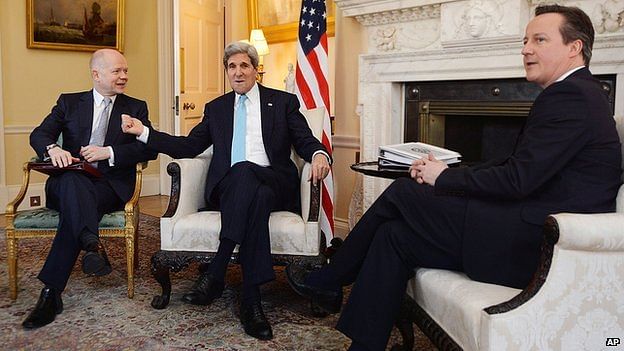Ukraine crisis: US and Russia in key London talks
Ukraine crisis: US and Russia in key London talks

US Secretary of State John Kerry is holding talks on Ukraine with his Russian counterpart in London, in an attempt to defuse tensions two days before a disputed referendum in Crimea.
Kerry is expected to tell Sergei Lavrov that the referendum and Russia's military intervention in Crimea could trigger concerted US and EU sanctions.
He earlier warned of "very serious steps" if Russia annexes the region.
On Thursday, Russia insisted at the UN it did "not want war" with Ukraine.
During an emergency meeting of the Security Council, Moscow's ambassador to the UN Vitaly Churkin defended the right of Crimea, which is predominantly ethnic Russian, to decide whether or not to join the Russian Federation.
Russia's military intervention followed the fall of Ukraine's pro-Moscow President Viktor Yanukovych on 22 February.
'Difficult task'
UK Foreign Secretary William Hague, who met Mr Kerry alongside Prime Minister David Cameron on Friday, said the US and Russian foreign ministers would find it hard to make progress.
"The fact that so far Russia hasn't taken any actual action to de-escalate tensions makes this a formidably difficult task today," he said.
Ahead of the talks, Lavrov acknowledged the crisis was a "difficult situation" to be in. "Many events have happened and a lot of time has been lost," he told reporters.
Before his arrival in London, Kerry warned "there will be a very serious series of steps on Monday in Europe and here [in Washington] with respect to the options that are available to us" if there is no movement on the Crimea referendum issue.
He did, however, say the US is eager not to impose further sanctions on Russia.
The mood music so far this morning has not been encouraging, reports the BBC's Diplomatic Correspondent Bridget Kendall.
She says Kerry may propose that even if the referendum cannot be stopped, Moscow might agree to halt the process of it breaking away to join Russia, possibly in return for greater self-rule from Kiev.
But there is no sign the Russians are prepared to contemplate this sort of compromise, she warns.
'Right to protect'
Russia's foreign ministry said in a statement on Friday that it reserved the right to protect "the lives of compatriots and fellow citizens in Ukraine".
The Kiev authorities, it said, were not "in control of the situation in the country", referring to fierce clashes between hundreds of pro-Russia protesters and Kiev supporters in the eastern city of Donetsk on Thursday that left one man dead and several others injured.
Russia also called on the Organization for Security and Co-operation in Europe (OSCE) to send observers to monitor the Crimea vote.
The Russian foreign ministry said the logistics of the mission should be in agreement with "the leadership of Ukraine's regions where (the mission) is expected to be deployed".
Russia has refused to recognise the interim leadership that took over in Kiev with Yanukovych's departure or to participate in a contact group aimed at bringing the two countries together for talks.
'Legal vacuum'
Speaking at the UN on Thursday, Moscow's ambassador to the UN Vitaly Churkin said the referendum in Crimea had come about because of a "legal vacuum" in the country and questioned why Crimeans should not be "afforded the opportunity" to decide on their future.
Ukraine's interim Prime Minister Arseniy Yatsenyuk had earlier said that his country was a victim of Russian aggression, producing a copy of the UN Charter to make his point that Moscow was violating it and several other international treaties.
The US is circulating a resolution stating that Sunday's referendum in Crimea has no validity, our correspondent in New York says.
In other developments, Russia launched new military exercises near its border with Ukraine on Thursday involving more than 8,000 troops and large artillery units such as rocket launchers and anti-tank weapons.
Meanwhile, Russian media on Friday reported that Russian fighter jets and helicopters had started training flights over the Mediterranean Sea.